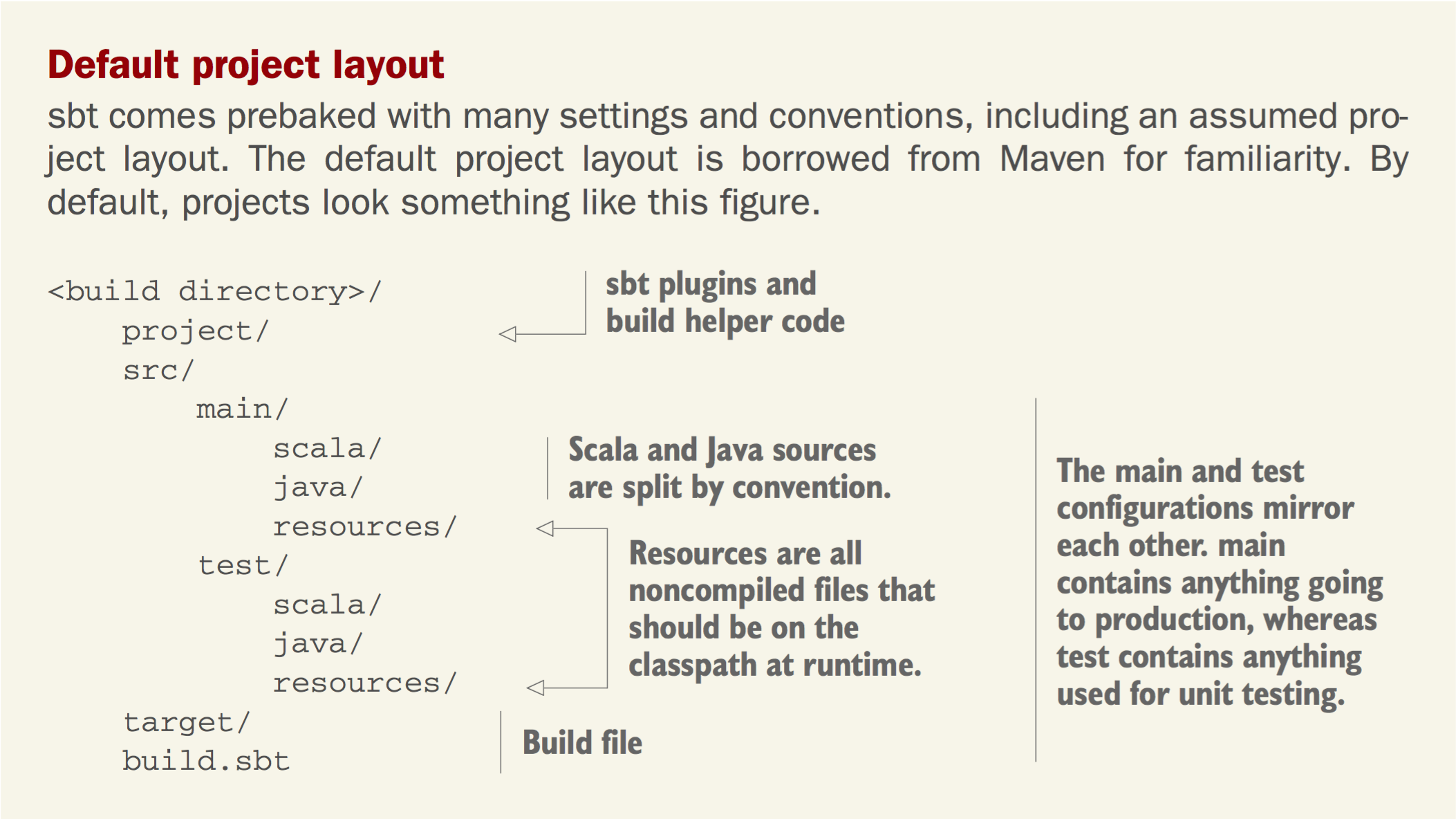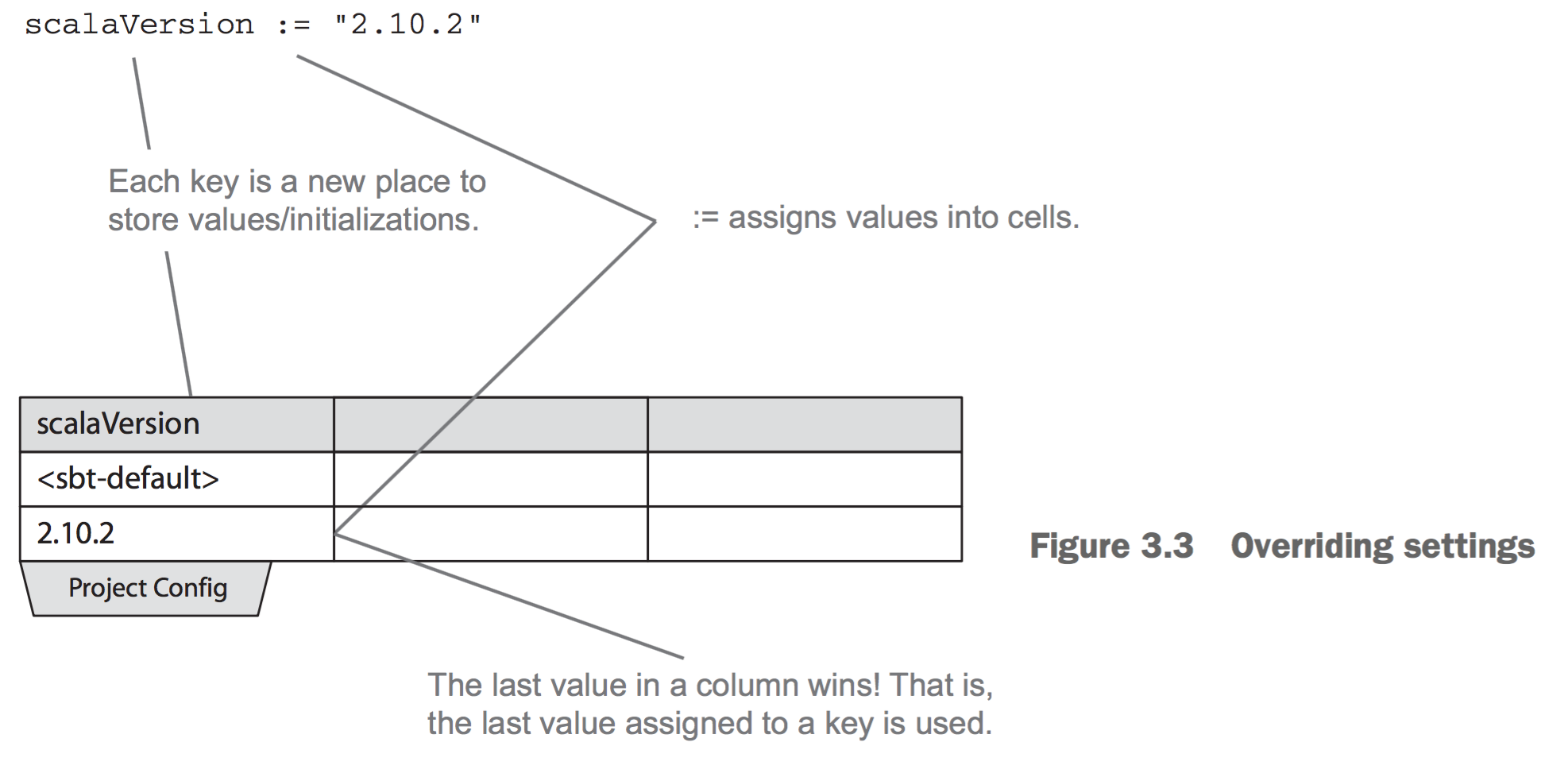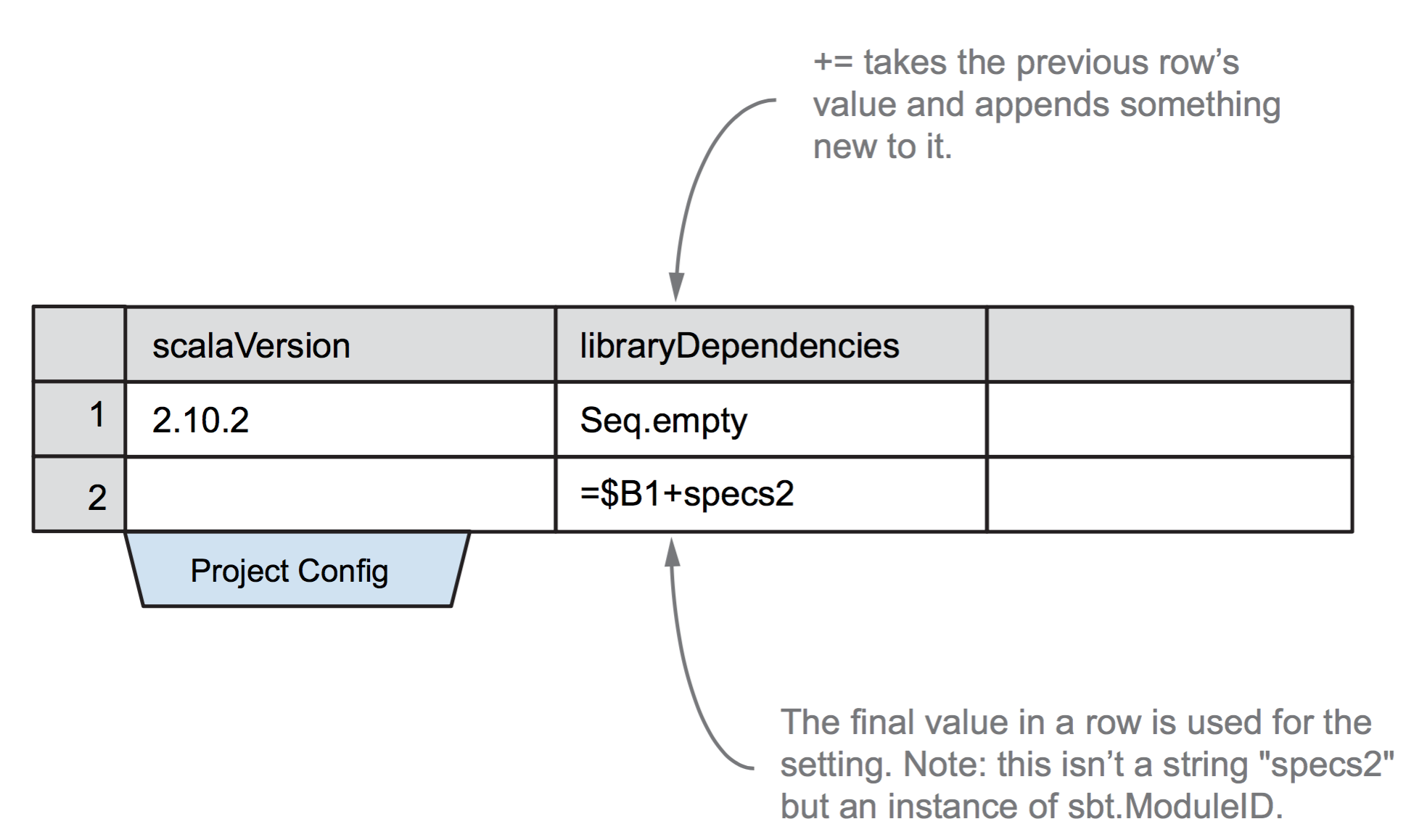Scala Tutorial 1
What does the scala project looks like?
By default, sbt follows Maven project layout i.e. Scala source files are placed inside src/main/scala and test source files are placed inside src/test/scala

-
build.sbt
Setting dependency, project configuration, task, scalac options, and so on.
-
plugin.sbt
Setting the plugin of this project
-
build.properties
Setting the sbt version
-
Dependencies.scala
Define the custom task or configuration
How to create a scala project?
-
Copy
Copy an exsiting project, then modify the build.sbt, plugin.sbt, build.properties to use your project configuration
-
Shell
Generate an universal project structure by shell script, here is an example
-
Giter8
sbt support Giter8 template, we can generate an project structure from an template
sbt new sjmyuan/scala-seed.g8For more template, please visit the Giter8 wiki
How to config project?
:= is a function defined in the sbt library. It is used to define a setting that overwrites any previous value without referring to other settings.

-
Common options
name := "tasky" version := "0.1.0" scalaVersion := "2.11.6" sbtVersion := "0.13.8" -
scala compiler options
scalacOptions ++= Seq("-feature", "-language:_", "-unchecked", "-deprecation", "-encoding", "utf8")
You can find all the options by following command
sbt settings
How to add dependency?
Dependency has following format in which the configuration is optional:
groupID % artifactID % version % configuration
We can add dependency like this:


libraryDependencies += "org.scalatest" %% "scalatest" % "2.2.6" % "test" // add single dependency
libraryDependencies ++= Seq(
"com.typesafe.slick" %% "slick" % "2.1.0",
"net.databinder" %% "unfiltered-netty-server" % "0.8.4") // add multiple dependencies
How to add plugin?
Add following settings into plugins.sbt
addSbtPlugin("net.virtual-void" % "sbt-dependency-graph" % "0.7.4")
How to add another repository?
resolvers += "Scalaz Bintray Repo" at "http://dl.bintray.com/scalaz/releases"
How to define tasks?
- Defination
val gitCommitCountTask = taskKey[String]("Prints commit count of the current branch")
gitCommitCountTask := {
val branch = Process("git symbolic-ref -q HEAD").lines.head.replace("refs/heads/","")
val commitCount = Process(s"git rev-list --count $branch").lines.head
println(s"total number of commits on [$branch]: $commitCount")
commitCount
}
- Depend other task, just use other task key like a function
val logTask = taskKey[String]("log the commit count")
gitCommitCountTask := {
val commitCount = gitCommitCountTask.value
println(s"Info: $commitCount")
""
}
You can find all the task by following command
sbt tasks
How to publish package?
sbt build
sbt test
sbt run
sbt package
How to write main method?
-
App trait
object Hello extends Greeting with App { println(greeting) } -
Object main method
object Hello1 extends Greeting { def main(args:Array[String]): Unit = { println(greeting) } }
How to write test?
-
FunSuite
import org.scalatest.FunSuite class SetSuite extends FunSuite { test("An empty Set should have size 0") { assert(Set.empty.size == 0) } test("Invoking head on an empty Set should produce NoSuchElementException") { assertThrows[NoSuchElementException] { Set.empty.head } } } -
FlatSpec
import org.scalatest.FlatSpec class SetSpec extends FlatSpec { "An empty Set" should "have size 0" in { assert(Set.empty.size == 0) } it should "produce NoSuchElementException when head is invoked" in { assertThrows[NoSuchElementException] { Set.empty.head } } } -
FunSpec
import org.scalatest.FunSpec class SetSpec extends FunSpec { describe("A Set") { describe("when empty") { it("should have size 0") { assert(Set.empty.size == 0) } it("should produce NoSuchElementException when head is invoked") { assertThrows[NoSuchElementException] { Set.empty.head } } } } } -
WordSpec
import org.scalatest.WordSpec class SetSpec extends WordSpec { "A Set" when { "empty" should { "have size 0" in { assert(Set.empty.size == 0) } "produce NoSuchElementException when head is invoked" in { assertThrows[NoSuchElementException] { Set.empty.head } } } } } -
FreeSpec
import org.scalatest.FreeSpec class SetSpec extends FreeSpec { "A Set" - { "when empty" - { "should have size 0" in { assert(Set.empty.size == 0) } "should produce NoSuchElementException when head is invoked" in { assertThrows[NoSuchElementException] { Set.empty.head } } } } } -
PropSpec
import org.scalatest._import prop._import scala.collection.immutable._ class SetSpec extends PropSpec with TableDrivenPropertyChecks with Matchers { val examples = Table("set", BitSet.empty, HashSet.empty[Int], TreeSet.empty[Int]) property("an empty Set should have size 0") { forAll(examples) { set => set.size should be(0) } } property("invoking head on an empty set should produce NoSuchElementException") { forAll(examples) { set => a[NoSuchElementException] should be thrownBy { set.head } } } } -
FeatureSpec
import org.scalatest._ class TVSet { private var on: Boolean = false def isOn: Boolean = on def pressPowerButton() { on = !on } } class TVSetSpec extends FeatureSpec with GivenWhenThen { info("As a TV set owner") info ("I want to be able to turn the TV on and off") info ("So I can watch TV when I want") info ("And save energy when I'm not watching TV") feature("TV power button") { scenario("User presses power button when TV is off") { Given("a TV set that is switched off") val tv = new TVSet assert (!tv.isOn) When("the power button is pressed") tv.pressPowerButton() Then("the TV should switch on") assert (tv.isOn) } scenario("User presses power button when TV is on") { Given("a TV set that is switched on") val tv = new TVSet tv.pressPowerButton() assert (tv.isOn) When("the power button is pressed") tv.pressPowerButton() Then("the TV should switch off") assert (!tv.isOn) } } } -
RefSpec (JVM only)
import org.scalatest.refspec.RefSpec class SetSpec extends RefSpec { object `A Set` { object `when empty` { def `should have size 0` { assert(Set.empty.size == 0) } def `should produce NoSuchElementException when head is invoked` { assertThrows[NoSuchElementException] { Set.empty.head } } } } }

Comments